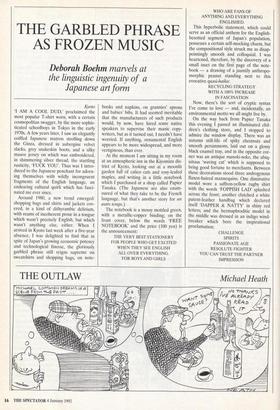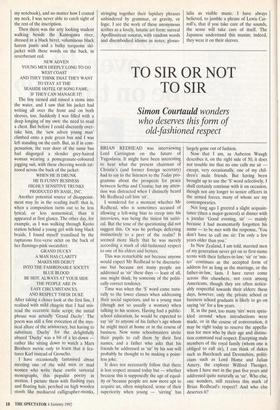THE GARBLED PHRASE AS FROZEN MUSIC
Deborah Boehm marvels at
the linguistic ingenuity of a Japanese art form
Kyoto 'I AM A COOL DUD,' proclaimed the most popular T-shirt worn, with a certain cosmopolitan swagger, by the more sophis- ticated schoolboys in Tokyo in the early 1970s. A few years later, I saw an elegantly coiffed Japanese matron strolling down the Ginza, dressed in aubergine velvet slacks, grey snakeskin boots, and a silky mauve jersey on which was embroidered, in shimmering silver thread, the startling rusticity, 'FUCK YOU'. Thus was I intro- duced to the Japanese penchant for adorn- ing themselves with wildly incongruent fragments of the English language, an endearing cultural quirk which has fasci- nated me ever since.
Around 1980, a new trend emerged: shopping bags and shirts and jackets cov- ered, in a kind of dithyrambic delirium, with reams of incoherent prose in a tongue which wasn't precisely English, but which wasn't anything else, either. When I arrived in Kyoto last week after a five-year absence, I was delighted to find that in spite of Japan's growing economic potency and technological finesse, the gloriously garbled phrase still reigns supreme on sweatshirts and shopping bags, on note- books and napkins, on grannies' aprons and babies' bibs. It had seemed inevitable that the manufacturers of such products would, by now, have hired some native speakers to supervise their manic copy- writers, but as it turned out, I needn't have worried. If anything, ornamental English appears to be more widespread, and more vertiginous, than ever.
At the moment I am sitting in my room at an atmospheric inn in the Kiyomizu dis- trict of Kyoto, looking out at a moonlit garden full of calico cats and rosy-leafed maples, and writing in a little notebook which I purchased at a shop called Papier Tanaka. (The Japanese are also enam- oured of what they take to be the French language, but that's another story for un autre temps.)
The notebook is a mossy mottled green, with a metallic-copper binding; on the front cover, below the words 'FREE NOTEBOOK' and the price (100 yen) is the announcement: THE VERY BEST STATIONERY FOR PEOPLE WHO GET EXCITED WHEN THEY SEE ENGLISH ALL OVER EVERYTHING.
FOR BOYS AND GIRLS WHO ARE FANS OF ANYTHING AND EVERYTHING ENGLISHED.
This hyperbolic statement, which could serve as an official anthem for the English- besotted segment of Japan's population, possesses a certain self-mocking charm, but the compositional style struck me as disap- pointingly smooth and colloquial. I was heartened, therefore, by the discovery of a small inset on the first page of the note- book — a drawing of a jauntily anthropo- morphic peanut standing next to this evocative quasi-haiku:
RECYCLING STRATEGY WITH A 100% INCREASE IN FASCINATION
Now, there's the sort of cryptic syntax I've come to love — and, incidentally, an environmental motto we all might live by.
On the way back from Papier Tanaka this evening I passed an illuminated chil- dren's clothing store, and I stopped to admire the window display. There was an autumn still-life of spiky chestnuts and smooth persimmons, laid out on a glossy black enamel tray, and in the opposite cor- ner was an antique maneki-neko, the ubiq- uitous 'waving cat' which is supposed to bring good fortune to merchants. Between these decorations stood three androgynous flaxen-haired mannequins. One diminutive model wore a saffron-yellow rugby shirt with the words 'FOPPISH LAD' splashed across the front; another clutched a white patent-leather handbag which declared itself 'DAPPER & NATTY' in shiny red letters; and the hermaphroditic model in the middle was dressed in an indigo wind- breaker which bore the inspirational proclamation:
CHALLENGE SPIRITS PASSIONATE AGE RESOLUTE FIGHTER YOU CAN TRUST THE PARTNER IMPRESSION WE PRESENTING A SENSE OF FRESHNESS The outfit was completed by a pair of blue denim shorts with a blunted diamond of wistful gibberish printed on one pocket: YOUR CLUB 3 DAY-TALK WE NEVER MADED TO THE BIG TIMES STAGE BUT DISTRICT CHILDREN'S LAND TIPTOP
With my head reeling slightly from this trip through the linguistic looking-glass, I tottered back to the inn — passing, on the way, such intriguingly named establish- ments as 'Coffee Shop Selfish' and Tea and Cake White Lover'. A vividly made-up woman brushed by me, walking her micro- scopic dog — one of those fluffy minia- tures, resembling a blow-dried sea anemone, which are so popular (and so practical) in Japan — and I couldn't resist twisting my head to check out the back of her fancy baseball-style jacket. The contor- tionist move paid off: there, in sinuous green script on lustrous black satin, were the words:
HE WAS SO EAGER THAT (FOR MEN) I COULD NOT HOLD HIM BACK (CONSIDERATION) I stopped for a moment, pole-axed by the spareness of the prose (or was it poet- ry?) and by the profundity of the implica- tion. Just then, an elderly man wearing a brown track suit stepped through a sliding door with his own tiny dog in tow. As they trotted across the street, I nonchalantly turned to see if something might be writ- ten across the old man's fragile shoulders, too. The reward was immediate: `POSH BOY', bragged the tall Gothic letters, in luminous gold. I was euphoric all the way home, in spite of a faintly sore neck voyeuristic whiplash.
The hazards of this preoccupation of mine are not exclusively physical. It can also lead to an emotional state, brought on by the frustration of being unable to read a complex composition in its entirety. Some- times the print is too small. Sometimes a knapsack covers the last line, or an arm across the chest obscures the denouement; often, the wearer is simply moving so fast, rushing to hail a cab or to catch the last train to Musasabi-cho, that the giddy vil- lanelle on the back of a jacket is reduced to a rainbow blur. Ah, the ones that got away; all those unsolved mysteries lost in the turn of a corner, the bend of an elbow, the slam of a door.
I remember a little girl's hat, a quintessentially dapper-and-natty grey felt bowler with a scarlet band on which was written, in a language not unlike French: Petits Battements Sur et De Pied . ('Small Palpitations On and Of the Foot '?) We were sitting at an outdoor tea- and-sweet-dumpling shop just below Kiy- omizu temple (she with her family, I with my notebook), and no matter how I craned my neck, I was never able to catch sight of the rest of the inscription.
Then there was the arty looking student walking beside the Kamogawa river, dressed in a black beret, voluminous black harem pants and a bulky turquoise ski- jacket with these words on the back, in reverberant red: NEW ADVEN YOUNG MEN DEEPLY LONG TO GO WEST COAST AND THEY THINK THAT THEY WANT TO STAY AT THE SEASIDE HOTEL OF SONG FAME, IF THEY CAN MANAGE IT! The boy turned and tossed a stone into the water, and I saw that his jacket had writing all over the front and on both sleeves, too. Suddenly I was filled with a deep longing of my own: the need to read a chest. But before I could discreetly over- take him, the 'new adven young man' climbed onto a pale green bus and I was left standing on the curb. But, as if in com- pensation, the rear door of the same bus had disgorged a slender grey-haired woman wearing a pomegranate-coloured jogging suit, with these cheering words tat- tooed across the back of the jacket: WHEN HE IS DRUNK HE IS FUNNY BUSINESS HIGHLY SENSITIVE TRUNKS PRODUCED BY BASIL, INC. Another potential source of disappoint- ment may lie in the reading itself: that is, when a composition turns out to be less lyrical, or less nonsensical, than it appeared at first glance. The other day, for example, as I was walking through Kyoto station behind a young girl with long black braids, I found myself transfixed by the rapturous free-verse octet on the back of her flamingo-pink sweatshirt: GRAND DUCKY A MAN HAS CLARITY MAKES HIS DEBUT INTO THE FASHIONABLE SOCETY BLUE BLOOD BE HOT, ALWAYS AT YOUR SIDE THE PEOPLE ARE IN EASY CIRCUMSTANCES,
AND RESPECT THEIR DUKE After taking a closer look at the first line, I realised with mild chagrin that I had mis- read the eccentric italic script; the initial phrase was actually 'Grand Duchy'. The poem was still a fine evocation of the mys- tical allure of the aristocracy, but having to substitute 'Duchy' for the delightfully absurd 'Ducky' was a bit of a let-down rather like sitting down to watch a Marx Brothers movie only to learn that it fea- tures Karl instead of Groucho.
I have occasionally fantasised about meeting one of the wild men or mad women who write these exotic sartorial monographs, this populist poetry in motion. I picture them with flashing eyes and floating hair, perched on high wooden stools like mediaeval calligrapher-monks, stringing together their lapidary phrases unhindered by grammar, or gravity, or logic. I see the work of these anonymous scribes as a lovely, lunatic art form: surreal Apollinairean sonatas, with random words and disembodied idioms as notes; glosso- lalia as visible music. I have always believed, to jumble a phrase of Lewis Car- roll's, that if you take care of the sounds, the sense will take care of itself. The Japanese understand this maxim; indeed, they wear it on their sleeves.












































 Previous page
Previous page